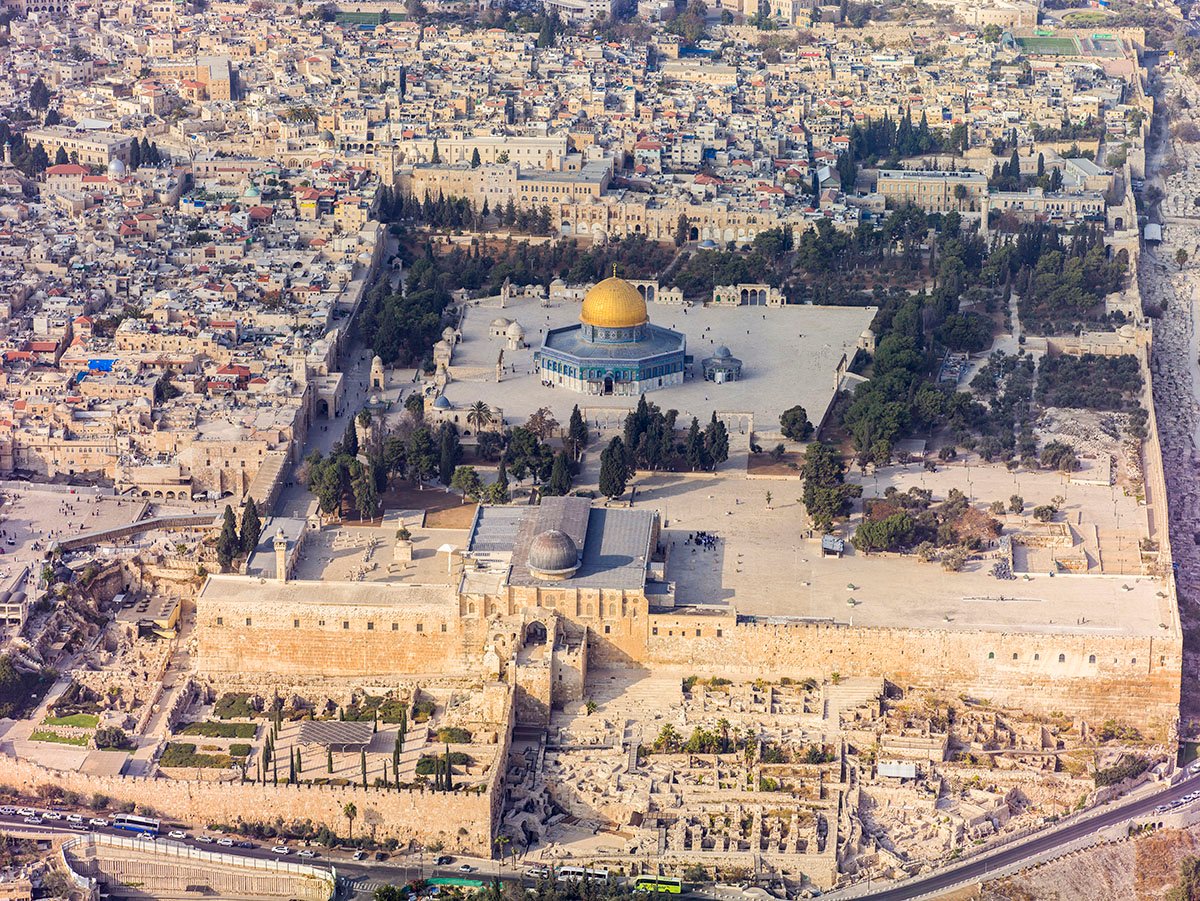The History and Future of Jerusalem
Jerusalem is one of the world’s quagmires. Contested by multiple religions and site of much division and violence, what is the past and future of this city?
Aerial view of the Temple Mount in Jerusalem. 
It’s not a new idea. In fact, in 1995 the U.S. Congress passed the “Jerusalem Embassy Act,” recognizing Jerusalem as the undivided capital of Israel by requiring the relocation of the U.S. embassy to Jerusalem. On June 5, 2017, the U.S. Senate passed a resolution celebrating the 50th anniversary of Jerusalem’s reunification and calling on President Trump to abide by the 1995 resolution to relocate the embassy.
Aaron David Miller, a former Israeli-Palestinian peace negotiator, pointed out the danger of the move: “It’s hard to come up with a single act that would make the Middle East burn more than it is burning right now.” Palestinian official Nabil Shaath said: “Moving the embassy is the same as recognising Jerusalem as Israel’s united capital. It’s a war crime. … There’s no way we or the Arab world could accept it. It would mean the end of the US as the broker of the peace process. We would fight back and mobilise the rest of the world against the move.”
With “Salem” meaning “peace” (Hebrews 7:2), the name Jerusalem likely means “city of Peace.” But the city has been far from peaceful. As we progress toward the end times, the Bible reveals that Jerusalem will be at the center of events that will affect the entire world.
A brief history
Jerusalem is first mentioned in the Bible when the king of Jerusalem, Adoni-Zedek, petitioned help from neighboring kings to attack the Gibeonites for making a peace agreement with the Israelites (Joshua 9:3-15; 10:1-5). Joshua came to the rescue and destroyed the Gibeonites’ enemies (Joshua 10:25-26).
An artist's depiction of the Roman siege and destruction of Jerusalem in A.D. 70. 
Later the Jebusites inhabited the city (Joshua 15:63; Judges 1:21) before King David took the city and made it the capital of Israel and the center of worship (2 Samuel 5:5-8; 1 Chronicles 15:1-3).
The city remained under Judah’s control until it was conquered and destroyed by the Babylonians around 587-585 B.C. (Jeremiah 52:12-14). After Babylon fell, the city fell to the Persians and Medes, then the Greeks. Later it was taken by the Roman Empire, which controlled Jerusalem when Jesus Christ walked this earth. About 40 years after Christ was crucified, the Romans destroyed Jerusalem and Herod’s temple, slaughtering and taking captive most of the inhabitants.
During the Dark Ages of Europe, Jerusalem became the center of “holy” wars (the Crusades), with Catholics and Muslims fighting for control of the city. To learn more, read “Jerusalem: Why Three Major Religions Claim It.”
A nation again
David Ben-Gurion proclaiming the independence of the State of Israel.
In 1967 the same nations prepared to attack Israel again. Israel again emerged victorious from what is now known as the Six-Day War. It tripled its territory and gained control of the eastern part of Jerusalem—putting the entire city in Jewish hands.
But the result of these wars left thousands of Palestinians without a homeland. Fifty years later, the world still has not solved this problem—which has been compounded in difficulty by terrorism.
Burden of Jerusalem
President Trump has said that Middle East peace might be “not as difficult as people have thought.” For over half a century, many have worked hard to try to bring peace to this region, yet that goal has proven elusive. Why? The Bible clearly tells us that human beings do not know the way of peace (Romans 3:17; Isaiah 59:8).
For over half a century, many have worked hard to try to bring peace to this region, yet that goal has proven elusive.
Even though there is a Jewish nation, the sacrifices that were such a major part of Jerusalem’s history have not been reinstituted (Hosea 3:4). For years, factions inside Israel have tried to reinstitute those sacrifices at or near the site of the Temple Mount. Just this year, the Temple Institute held a Passover sacrifice in the Old City of Jerusalem after being denied their request to perform the ceremony in an archaeological park close to the Western Wall. Prophecies show that sacrifices will resume in the future before they are “taken away” by a religious power (Daniel 7:8, 21; 8:11).
When “Jerusalem [is] surrounded by armies” (Luke 21:20), its desolation will be close. Jesus Christ warned that this time would be so bad that unless He intervenes “no flesh would be saved” (Mathew 24:22)—complete human extinction. Sacrifices will be stopped, and the “abomination of desolation” will be set up in Jerusalem (Mathew 24:15; Daniel 12:11). To learn more, read our article “Abomination of Desolation: What Is It?” and “Times of the Gentiles.”
We are seeing more nations (like Turkey) and the European Union getting involved in Jerusalem. Jerusalem will move to “center stage” in world politics. God prophesied that Jerusalem will be like a “very heavy stone” that will crush whoever tries to lift it (Zechariah 12:3).
Jerusalem’s final battle and future hope
The city of Jerusalem will eventually be divided in half (Zechariah 14:2). In the final battle in which armies gathered near Jerusalem will fight the returning Jesus Christ, He will bring His judgment on those who “divided up My land” (Joel 3:2). Interestingly, many nations today support the pre-1967 borders where Jerusalem was divided in half. Zechariah 14:2 indicates a violent “taking” of the city instead of a peaceful partition.
Thankfully, the good news is that Jerusalem will eventually have peace! Jesus Christ will return and establish His Kingdom, which will last “forever, even forever and ever” (Daniel 2:44-45; 7:14, 18, 27). He will “again choose Jerusalem” (Zechariah 2:12) as His headquarters, and people of all nations shall seek “the word of the LORD from Jerusalem” (Micah 4:1-2)!
God speed the day when Jerusalem is the capital of the earth—and not its biggest quagmire.
To learn more about end-time prophecy, peruse our articles about the “End Times.”
Photo by Andrew Shiva / Wikipedia, CC BY-SA 4.0, https://commons.wikimedia.org/w/index.php?curid=30066666
Date Posted: June 8, 2017

 by Isaac Khalil
by Isaac Khalil

